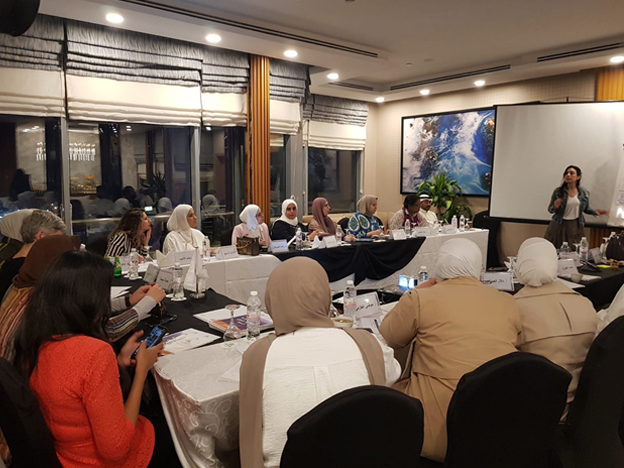Geneva Institute for Human Rights
The second training program, titled "International Mechanisms for Women's Rights Protection," was held as part of the collaboration agreement between the "Women's Union" and the Geneva Institute for Human Rights. The training program had 25 participants from Kuwait and took place from May 2023.
The Kuwaiti Women's Associations Union emphasized its commitment to raising awareness about women's fundamental rights, enhancing their societal role, strengthening their position, and developing their capabilities in various government and private sectors, all in line with the generous Islamic Sharia, to achieve sustainable community development.
Sheikha Fadia Saad Al-Abdullah Al-Sabah, Chairperson of the Union's Board of Directors, stated in a press release on the sidelines of the second training program organized by the Union in cooperation with the Geneva Institute for Human Rights that this course is conducted under the framework of a joint cooperation agreement between the two parties.
She noted that the training program is titled "International Mechanisms for Women's Rights Protection" and is part of the common collaboration agreement in the field of promoting and protecting women's rights and the Sustainable Development Goals for 2030. The program spans six days.
The objective of the training program is to provide a comprehensive understanding of international mechanisms for women's rights protection and how to use them to promote and protect women's rights in Kuwait.
It was designed as an interactive and dynamic educational experience that allows participants to interact with each other, share their experiences and opinions, and provide them with a broad overview of the treaty bodies system, the special procedures system, and the Universal Periodic Review mechanism and its connection to the Women, Peace, and Security Agenda (UNSCR 1325).
The program aims to equip participants with the knowledge, skills, and tools necessary to utilize international human rights mechanisms for the promotion and protection of women's rights. It also focuses on raising women's awareness of the provisions of international agreements signed by Kuwait and provisions exempted due to non-alignment with our generous Sharia.
Sheikha Fadia Al-Saad emphasized that the number of beneficiaries in the training course reached 25 participants, both males and females, holding advanced academic qualifications and representing various sectors in the country, including the government and the private sector, all with the aim of achieving sustainable community development.
She highlighted the importance of the role of civil society organizations, which significantly contribute to enhancing government roles. She underlined the significance of the course and its content, which targets educating trainees about human rights concepts and international charters.
On the other hand, the Executive Director of the Geneva Institute for Human Rights, Nazar Abdelkader, stated that the course is part of the joint project between the Kuwaiti Union and the Geneva Institute titled "Enhancing the Capabilities of Union Members in Women's Rights." He added that the goal is to enhance the capabilities of members of associations under the Kuwaiti Women's Associations Union in the field of human rights, with a specific focus on women's issues.
Abdelkader mentioned that the course includes reviewing the Convention on the Elimination of All Forms of Discrimination Against Women and highlighting the rights covered by the convention, such as access to education, employment, healthcare, and political participation. There will be interactive group activities to bridge the gap between the stated rights and the practical reality. The course will also discuss strategies for raising awareness of the convention and review mechanisms, including governmental and non-governmental national human rights mechanisms, the regional mechanisms of the Arab Commission for Human Rights, and international treaty mechanisms.
Furthermore, the course will include an examination of non-treaty mechanisms and the role of the Special Rapporteur on violence against women, leading to the identification of recommendations and the drafting of a future action plan for the Union




